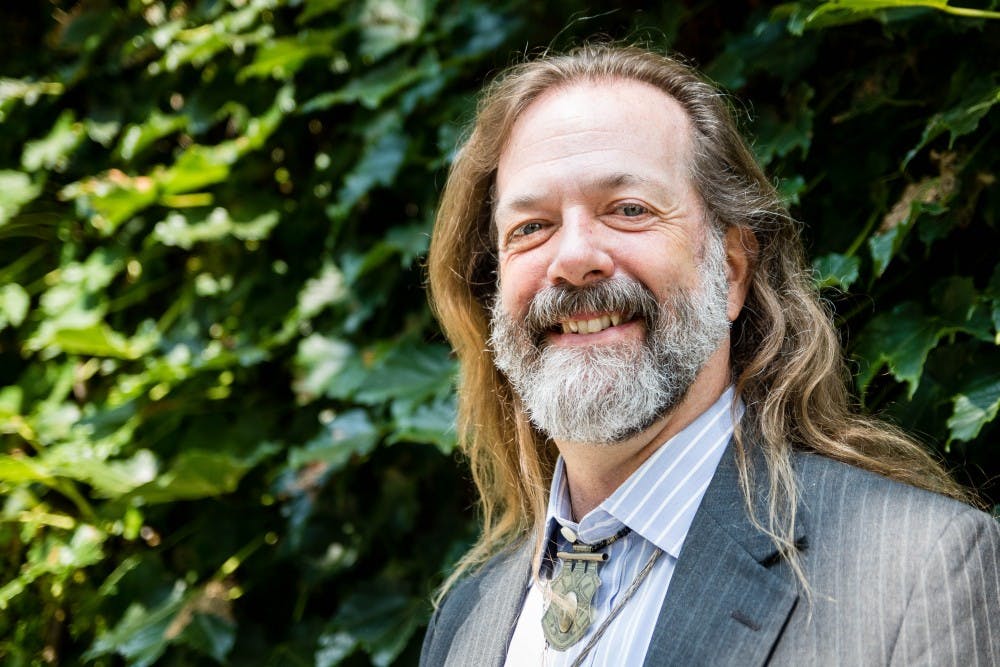Chief Diversity Officer Miller spent decades making universities more inclusive
Diversity officers are becoming more common at universities across the nation, but these positions are still relatively new. In April, Central Michigan University hired its first-ever vice president and chief diversity officer, A.T. Miller.
For about 30 years, Miller has helped lead diversity efforts in higher education. Miller was chosen in April and started working at CMU after Memorial Day. He described his first summer in Mount Pleasant as busy, from meeting staff and taking in information to making plans for CMU's diversity programs.
His passion for helping people and promoting inclusivity, however, started long before he began working in higher education.
“My parents were activists,” Miller said. “There are pictures of me in a stroller at open housing marches (in Chicago).”
His father’s family are Quakers, which is part of the reason why activism is so important to him. Quakers, also known as the Religious Society of Friends are a small sect of Christians who believe in peace, equality, and simplicity. There are just 400,000 Quakers in the world, according to QuakerSpeak, an informational web series. There are Quakers on every continent except Antarctica, though the majority of them live in East Africa.
As Miller completed his Bachelor’s degree in 1980, he learned through a Quaker organization about a school in Kenya that needed help. The school had no buildings and very few teachers. So he lead a fundraising effort and taught classes, trying to build up the school. In 1980 when he arrived, there were 75 students. When he left in 1988 there were 500.
“I thought I was going for 18 months,” he said. “I ended up staying for eight years. I couldn’t imagine what I could be doing in the U.S. that was more important.”
Miller worked as head of school until its was functioning well enough for him to be replaced by a Kenyan educator.
After his time in Kenya, he earned his doctorate in American Civilization from the University of Pennsylvania. He also studied African American culture.
His first job after graduate school was as a professor at Union College in New York. Miller started the Africana Studies program. He also headed the Multicultural Affairs Advisory Group and was a faculty sponsor for the LGBT group UBGLAAD and the faculty advisor for the African and Latino Alliance of Students.
After Union College, Miller worked at University of Michigan as the faculty director of the Center for Global and Intercultural Study. He said his job at Michigan was flipped from his job at Union.
“The main responsibility was for the things I was doing at Union voluntarily,” said Miller, who worked at U-M until 2011. “I still taught classes, but that wasn’t my main focus.”
His most recent job was at Cornell University in Ithaca, New York. He worked for seven years as an associate vice provost of academic diversity. One of five diversity officers at Cornell, he helped faculty make their classrooms more inclusive. He also did work in the Office of Academic Diversity Initiatives, the Learning Strategies Center, and the Intergroup Dialogue Project, an academic program also at CMU.
For his new role at CMU, Miller is in charge of the Office for Institutional Diversity and Inclusion and creating programs for students and faculty to make campus a more inclusive place.
“I am part of a first wave of people in this job,” Miller said. “Chief diversity officers are relatively new, but I have been working in this area for most of my career.”
The search was led by Katherine Lasher, executive director of the Office of Civil Rights and Institutional Equity and CMU’s Title IX coordinator.
“He thinks equally about programming, about curriculum and about the conversations we need to expand across campus,” Lasher said in an April 26 press release.
To begin his tenure at CMU, Miller said he is creating strategic plans to increase diversity. He also aims to increase the diversity of the faculty and staff. He will create a University Diversity Council with representatives from Student Government Association and faculty representatives from all of the colleges. The purpose of the council is to figure out how to increase diversity by gathering input from people in all areas of university life.
“It really has to come from the grassroots,” Miller said. “You can’t have someone from the top just telling people what to do. You have to do what’s appropriate for the different parts of the university.”
Miller also wants to send faculty to conferences like the National Conference on Race and Ethnicity, the White Privilege Conference and “Creating Change,” an LGBTQ activist conference.
He hopes to also work with people off campus. Miller said he wants to build a broader network for diversity with the Mount Pleasant community, including local business owners and members of the Saginaw Chippewa Indian Tribe.
“You achieve diversity through diversity,” he said.
In his three months here, Miller has already had CMU join the Hispanic Association of Colleges and Universities, explaining that CMU has more than 1,000 Hispanic students.
Inclusion cannot just come from the faculty and staff, Miller explained, it has to come from the students as well.
“Instead of trying to find people like you, think about where you could add something others can’t," Miller said.






